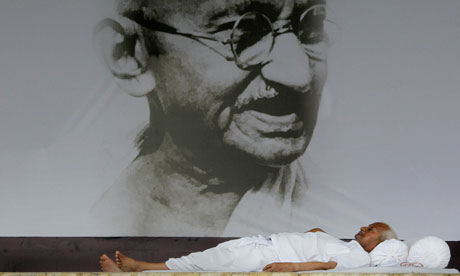
Anna Hazare, India's anti-corruption activist, on hunger strike in front of a giant portrait of Mahatma Gandhi. Photograph: Manish Swarup/AP
With his air of Gandhian austerity and his simple anti-corruption message, Anna Hazare has tapped into long-simmering grievances held by India's burgeoning middle class and its young. While major scams such as those over the Commonwealth Games in 2010 grab the headlines, it is endemic, low-level corruption of the kind described by Jason Burke that affects the ordinary Indian citizen more pressingly. What should be entitlements turn into favours granted by a petty official whose palms have to be greased: claiming a pension, acquiring a telephone connection, getting your child into school. For too long, Indians have tolerated the situation by saying chalta hai (a Hindi phrase meaning "it goes" – the equivalent of a shrug of the shoulders, or "that's just the way it is").
But beneath the surface, there are potentially troubling sides to Hazare's movement: a developing personality cult, an authoritarian tendency and the essentially urban, middle-class nature of the phenomenon. "Anna is India and India is Anna," proclaimed one of his leading followers recently, a disturbing echo of Indira Gandhi's dictatorial "emergency" during the mid 1970s, when a sycophantic politician came up with the slogan "Indira is India and India is Indira".
Some members of "Team Anna", as the Indian press has taken to calling it, are showing symptoms of the same sense of arrogance and self-righteousness – the belief that their man and their methods have the answers. They would do well to remember that theirs is only one set of voices among many who share the same general goal of extirpating corruption. An unelected, self-appointed group can't represent all India.
A largely middle-class movement such as Hazare's cannot claim to speak for the vast majority of Indians – the rural poor, Dalits and tribals, among others. In a functioning democracy with a free press – which India, for all its faults, is – governments need to listen to all these voices. As a former chief justice of the Delhi high court said recently: "Anna is not civil society and civil society is not Anna." Nevertheless, in the current mood of disillusionment with politicians, Hazare's air of purity, his straightforward message and his methods evoke a ready response.
If there are problems with the movement's methods and attitude, there are also troubling implications for representative democracy in India. The solution to corruption being proposed both by the government and the Hazare side is to establish a "lokpal" (literally "guardian of the people"). The details of this institution are complex, and there are many points of disagreement between the Hazare side, the Indian government and other groups over its scope and powers. In the version put forward by Team Anna, particularly, immense power – including power over the judiciary – will be concentrated in a single unelected institution requiring an army of inspectors who will probably be swallowed up by an impossible workload as they investigate allegations of corruption.
Blinkered by its feeling that it knows how to deal with the issue, the Hazare crusade ignores the multidimensionality of the problem and its solutions. The software entrepreneur Nandan Nilekani, now in charge of setting up a unique identification system for all Indian citizens, has been a vocal critic of the simplistic nature of Hazare's campaign, arguing that one law and one institution alone can't eliminate corruption. A multifaceted approach will be necessary. The very poorest, in particular, he argues, need to be given more choice so that they aren't dependent on just one or two potentially corrupt low-ranking functionaries for their dealings with the state – for instance the distribution system, which channels food at controlled prices to the poor and which, as it stands, is open to subversion on various levels. A lokpal – or an army of them – won't come anywhere near dealing with this kind of corruption.
It is one thing to tap into a public mood; it is quite another thing to devise viable anti-corruption systems. Whatever the solutions may be, they need to be worked out through public and parliamentary debate. Glib comparisons of Hazare with Gandhi are beside the point. Gandhi was not operating within a democratic environment. Anna Hazare is. He and his followers sometimes seem to be in danger of forgetting this.
No comments:
Post a Comment